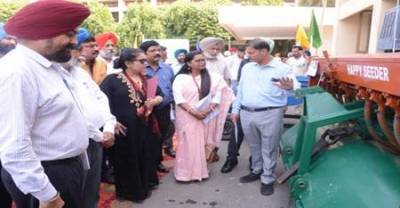LUDHIANA, 15 June 2023: The Ministry of Agriculture and Farmers' Welfare, in collaboration with the state of Punjab and Punjab Agricultural University (PAU), organized a workshop on 'Paddy Straw Management and Action Plans' to address the issue of stubble burning. The event saw the participation of senior government officials, stakeholders, farmers, and representatives from various organizations.
During the workshop, K.A.P. Sinha, Additional Chief Secretary of the Ministry of Agriculture and Farmers' Welfare in the Government of Punjab, stressed the importance of farming and expressed the desire to eliminate paddy straw burning. He proposed several measures, including increasing machinery capacity, deploying more equipment in high-burning areas, involving cooperative societies to support Scheduled Caste (SC) beneficiaries, and replicating successful initiatives. He expressed optimism that no-burn agriculture would become the norm by the following year.
Dr. Satbir Singh Gosal, Vice-Chancellor of PAU, highlighted the harmful effects of stubble burning on air and soil quality, as well as public health. He advocated for conservation agriculture as a solution to up-cycle paddy straw without waste. He emphasized the need for collaboration among government departments, NGOs, academia, industry, and farmers to combat the issue effectively.
Smt. S. Rukmani, Joint Secretary of the Department of Agriculture and Farmers' Welfare, briefed attendees on the Central Sector Scheme to support crop residue management. The scheme provides financial assistance to farmers and cooperative societies for purchasing machinery and establishing Custom Hiring Centres (CHCs). She emphasized the reduction in paddy straw burning since last year and the workshop's aim to create a value-chain plan for utilizing paddy straw as a resource while minimizing losses for farmers.
Arvind Nautiyal, Member Secretary of the Commission for Air Quality Management, highlighted the adverse effects of air pollution and recommended measures such as crop diversification and strategic mapping of villages. He proposed establishing briquetting/pelleting plants and developing a supply chain for utilizing straw as fuel in various industries.
Dr. Ajmer Singh Dhatt, Director of Research at PAU, discussed the institution's efforts in managing paddy straw with innovative machines and technologies. He encouraged farmers to adopt cost-effective and eco-friendly methods to enhance soil health and crop output.
The workshop also featured presentations from officials of the Ministry of Power, Ministry of Petroleum and Natural Gas, Ministry of New and Renewable Energy, and the Central Pollution Control Board, highlighting initiatives for biomass utilization and paddy straw management.
The workshop concluded with a summary of the major recommendations and a vote of thanks from the organizers.




















